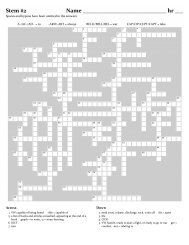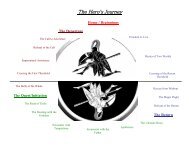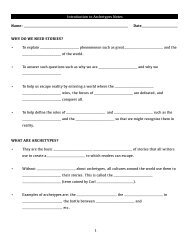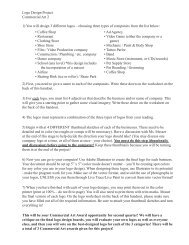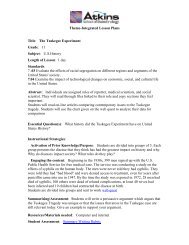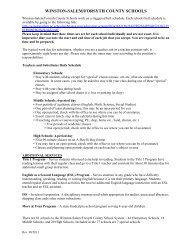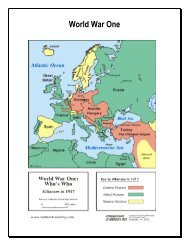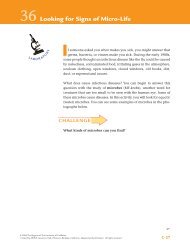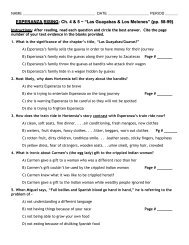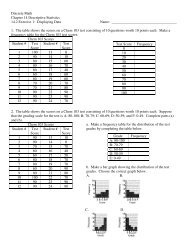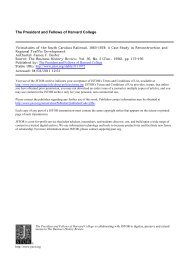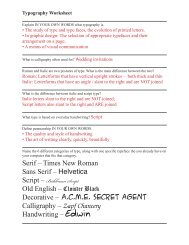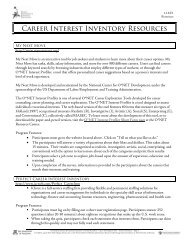You also want an ePaper? Increase the reach of your titles
YUMPU automatically turns print PDFs into web optimized ePapers that Google loves.
3 3READING TEST35 Minutes—40 QuestionsDIRECTIONS: There are four passages in this test. Eachpassage is followed by several questions. After readinga passage, choose the best answer to each questionand fill in the corresponding oval on your answerdocument. You may refer to the passages as often asnecessary.Passage I510152025303540PROSE FICTION: This passage is adapted from the short story“American History” by Judith Ortiz-Cofer (©1992 by JudithOrtiz-Cofer). The story appeared in the anthology IguanaDreams: New Latino Fiction.There was only one source of beauty and light forme my ninth grade year. The only thing I had anticipatedat the start of the semester. That was seeingEugene. In August, Eugene and his family had movedinto the only house on the block that had a yard andtrees. I could see his place from my bedroom window inEl Building. In fact, if I sat on the fire escape I was literallysuspended above Eugene’s backyard. It was myfavorite spot to read my library books in the summer.Until that August the house had been occupied by an oldcouple. Over the years I had become part of theirfamily, <strong>with</strong>out their knowing it, of course. I had a viewof their kitchen and their backyard, and though I couldnot hear what they said, I knew when they were arguing,when one of them was sick, and many other things. Iknew all this by watching them at mealtimes. I could seetheir kitchen table, the sink, and the stove. During goodtimes, he sat at the table and read his newspapers whileshe fixed the meals. If they argued, he would leave andthe old woman would sit and stare at nothing for a longtime. When one of them was sick, the other would comeand get things from the kitchen and carry them out on atray. The old man had died in June. The house had stoodempty for weeks. I had had to resist the temptation toclimb down into the yard and water the flowers the oldlady had taken such good care of.By the time Eugene’s family moved in, the yardwas a tangled mass of weeds. The father had spent severaldays mowing, and when he finished, from where Isat, I didn’t see the red, yellow, and purple clusters thatmeant flowers to me. I didn’t see this family sit down atthe kitchen table together. It was just the mother, a redheadedtall woman who wore a white uniform; thefather was gone before I got up in the morning and wasnever there at dinner time. I only saw him on weekendswhen they sometimes sat on lawn-chairs under the oaktree, each hidden behind a section of the newspaper;and there was Eugene. He was tall and blond, and hewore glasses. I liked him right away because he sat atthe kitchen table and read books for hours. Thatsummer, before we had even spoken one word to eachother, I kept him company on my fire escape.<strong>ACT</strong>-61C-PR<strong>ACT</strong>ICE34455055606570758085Once school started I looked for him in all myclasses, but P. S. 13 was a huge place and it took medays and many discreet questions to discover Eugene.After much maneuvering I managed “to run into him”in the hallway where his locker was—on the other sideof the building from mine—and in study hall at thelibrary where he first seemed to notice me, but did notspeak; and finally, on the way home after school oneday when I decided to approach him directly, thoughmy stomach was doing somersaults.I was ready for rejection, snobbery, the worst. Butwhen I came up to him and blurted out: “You’reEugene. Right?” he smiled, pushed his glasses up onhis nose, and nodded. I saw then that he was blushingdeeply. Eugene liked me, but he was shy. I did most ofthe talking that day. He nodded and smiled a lot. In theweeks that followed, we walked home together. Hewould linger at the corner of El Building for a few minutesthen walk down to his house.I did not tell Eugene that I could see inside hiskitchen from my bedroom. I felt dishonest, but I likedmy secret sharing of his evenings, especially now that Iknew what he was reading since we chose our bookstogether at the school library.I also knew my mother was unhappy in Paterson,New Jersey, but my father had a good job at the bluejeansfactory in Passaic and soon, he kept assuring us,we would be moving to our own house there. I hadlearned to listen to my parents’ dreams, which werespoken in Spanish, as fairy tales, like the stories aboutlife in Puerto Rico before I was born. I had been to theisland once as a little girl. We had not been back theresince then, though my parents talked constantly aboutbuying a house on the beach someday, retiring on theisland—that was a common topic among the residentsof El Building. As for me, I was going to go to collegeand become a teacher.But after meeting Eugene I began to think of thepresent more than of the future. What I wanted now wasto enter that house I had watched for so many years. Iwanted to see the other rooms where the old people hadlived, and where the boy spent his time. Most of all, Iwanted to sit at the kitchen table <strong>with</strong> Eugene like twoadults, like the old man and his wife had done, maybedrink some coffee and talk about books.GO ON TO THE NEXT PAGE.



